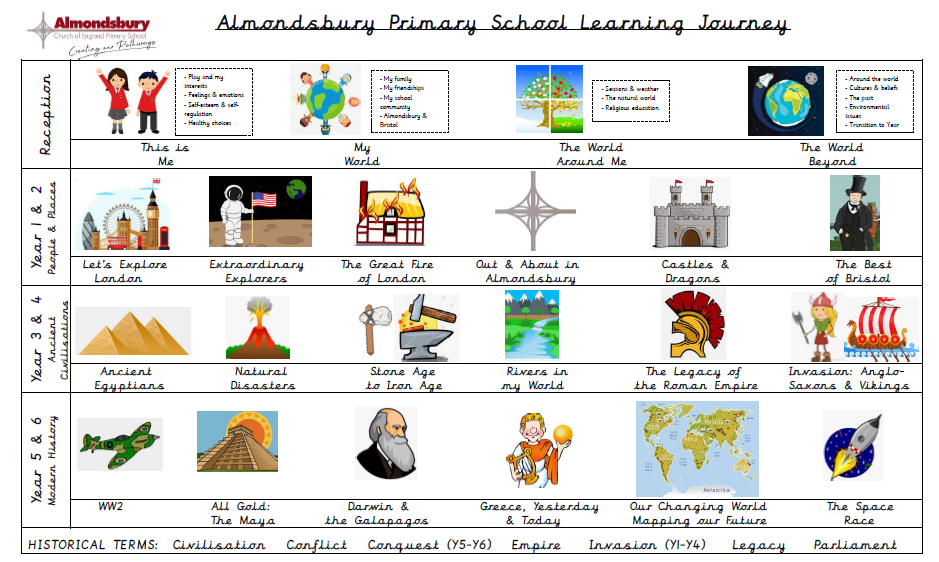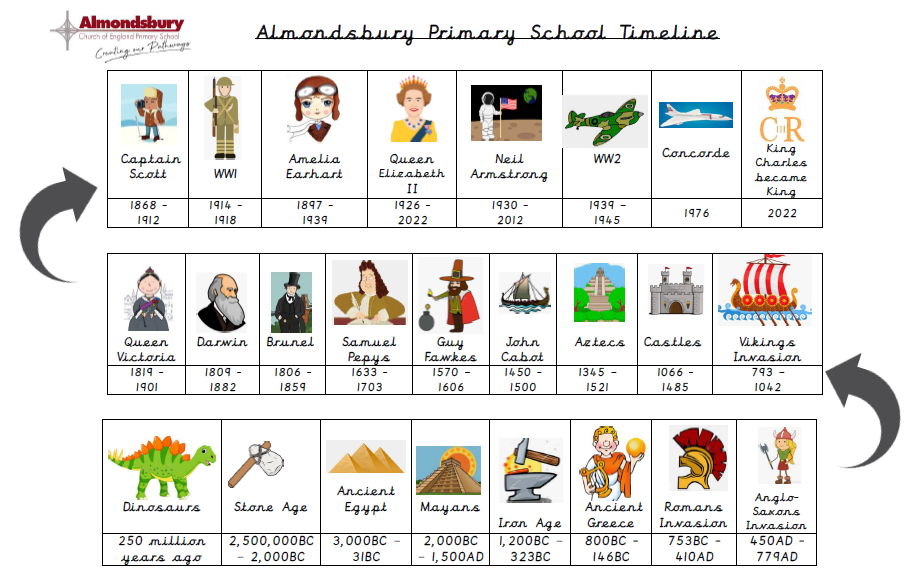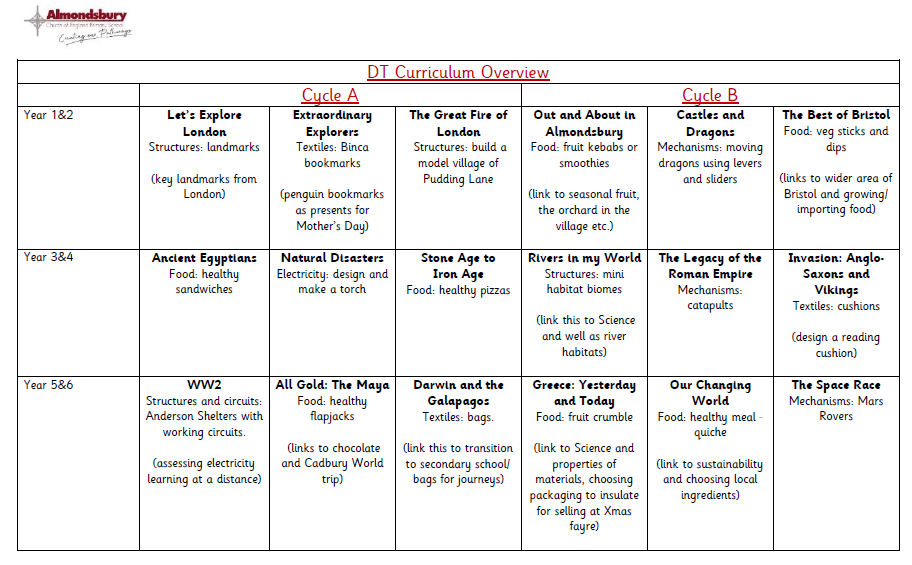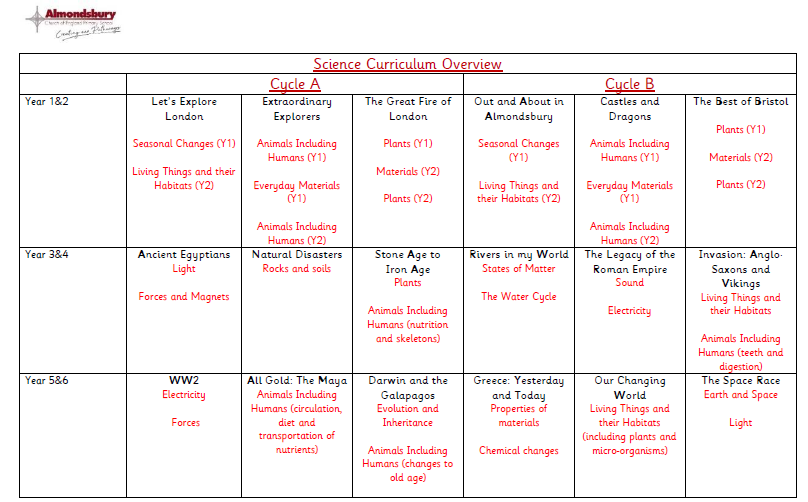Knowledge and Understanding
Knowledge and Understanding of the World
History, Geography, and Design and Technology (DT) are taught through a thematic topic approach at Almondsbury Primary School. This enables pupils to develop their knowledge and understanding of the world. We refer to this as KUW. Over the past year we have updated our KUW overview to further develop a long term plan that ensures a progression of skills and knowledge from Reception to Year 6. Through careful links and regular revisiting, we have produced a new thematic topic curriculum which enables the pupils to learn more and remember more. This will set the pupils up for future success to explore lifelong learning journeys, an element that is central to the Almondsbury Primary School vision of Creating our Pathways.
Our thematic topic teaching is built on developing the pupils’ historical and geographical understanding under the themes of local, regional, national and worldwide significance. Locally we study developments in our immediate area, such as looking at Almondsbury Village and The Severn. Regionally, we explore changes through time in the South West and the contributions of significant Bristolians. Our thematic topics with a national and worldwide theme are designed to help pupils gain a coherent knowledge and understanding of Britain’s past and that of the wider world. We aim to inspire, in pupils, a curiosity and fascination about the world and its people that will remain with the pupils for the rest of their lives. This will encourage them to make positive choices and to understand their impact as global citizens.
Through linking DT to our thematic topics, pupils are given real-life contexts for learning. We encourage pupils to use their creativity and imagination to design and make products that solve real and relevant problems within a variety of contexts, considering their own and others’ needs, wants and values. We also aim to make links to design and designers throughout history, providing opportunities for pupils to critically reflect upon and evaluate their designs.
Historical, geographical and technological skills are taught in a progression that builds through the school, allowing for key skills and knowledge to be regularly revisited so it stays with pupils throughout their learning journey. For History, there is a strong emphasis on developing pupils’ understanding of chronology, interpretations of evidence, changes within a time and across time periods and cause and consequence. Our curriculum is intended to equip pupils to ask questions about the past, analyse evidence, think critically, appreciate different perspectives and develop informed judgements. To develop geographical understanding, pupils regularly use map reading skills as well as being taught to interpret globes, draw their own maps and use symbols. Pupils of all ages are encouraged to develop their investigation ideas and interpret a range of geographical sources as well as undertake fieldwork. Through the DT curriculum, pupils should be inspired by engineers, designers, chefs and architects to enable them to create a range of structures, mechanisms, textiles and food products which they design, make and evaluate at every stage.
The use of high-quality texts plays a vital role in the design of our KUW curriculum. Each topic is linked to a book, chosen in collaboration with our English team, to give pupils a hook on which to hang their learning. Our reading spine, inspired by our thematic topic overview, is designed to ignite pupils’ curiosity about the world in which we live. This, alongside our engaging ‘wow’ days and many varied educational trips, enriches the learning experiences of the pupils and makes topics memorable, allowing pupils to retain more information which they build on as they move through the school.
We use termly themes which allow pupils to explore topics in more detail, linking their historical, geographical and technological understanding to other curriculum areas such as Science and Art. Pupils are therefore exposed to a thorough and all-encompassing approach to these subjects which engages and inspires their learning.
The curriculum follows set pattern that enables the pupils to revisit prior learning, which enhances their understanding of new concepts. This aids pupils to build their knowledge and understanding further. Further long and medium term plans have been created which detail this use of prior knowledge and links to next steps of learning. These are used by teacher to plan interesting and engaging learning experiences for all pupils.


History
The national curriculum for history aims to ensure that all pupils:
- Know and understand the history of Great Britain as a coherent, chronological narrative, from the earliest times to the present day. The children learn how people’s lives have shaped this nation and how Britain has influenced and been influenced by the wider world.
- Know and understand significant aspects of the history of the wider world, such as ancient civilisations, characteristic features of past non-European societies and achievements of mankind.
- Gain and deploy a historically-grounded understanding of abstract themes and subject specific terminology.
- Understand historical concepts which allow them to compare and contrast significant events and eras.
- Understand the methods of historical enquiry, including how evidence is gathered and used to make historical claims.
- Make connections between local, national and international history and culture.
Geography
The national curriculum for geography aims to ensure that all pupils:
- Develop knowledge of the location of places, seas and oceans, including their defining physical and human characteristics.
- Understand the processes that give rise to key physical and human geographical features of the world.
- Are competent in the use of geographical skills such as field work, map reading and data analysis.
Design & Technology
The national curriculum for design and technology aims to ensure that all pupils:
- Develop the creative, technical and practical expertise needed to perform everyday tasks confidently and to participate successfully in an increasingly technological world.
- Build and apply a repertoire of knowledge, understanding and skills in order to design and make high-quality prototypes and products for a wide range of users.
- Critique, evaluate and test their ideas and products and the work of others.
- Understand and apply the principles of nutrition and learn how to cook.

Science
The national curriculum for science aims to ensure that all pupils:
- Develop scientific knowledge and understanding through the specific disciplines of biology, chemistry and physics.
- Develop understanding of the nature, processes and methods of science through different types of science enquiries that help them to answer scientific questions about the world around them.
- Are equipped with the scientific knowledge required to understand the uses and implications of science, today and for the future.

Teaching and Organisation
KUW subjects are taught on a two yearly cycle. Children receive cross-curricular sessions for History, Geography and DT on a weekly basis, centring around their topic. Science is then taught discretely for an afternoon a week. This enables the children to make strong connections between their understanding while still fully developing their scientific, historical and geographical skills.
